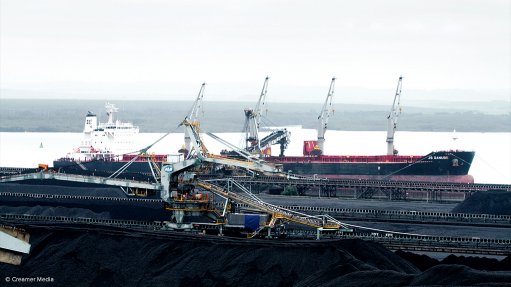
Photo by: Creamer Media
South Africa’s coal industry will have to contend with the same “headaches” as before this year, and without the advantage of record high prices.
This was noted by McCloskey by OPIS Southern Africa editor Randy Fabi, speaking during McCloskey’s webinar titled 'South Africa's Road Ahead: How are coal miners managing through power, rail and market headaches in 2023?' held on April 4.
He outlined that the challenges this year included, most notably, a fall in prices compared with 2022.
Rabi highlighted that last year saw South African prices increase considerably at one point owing to the war in Ukraine.
By comparison, this year has been “drastically different”. While prices were still historically high, they were not at the levels experienced last year.
Owing to last year’s high prices, there was a rare opportunity whereby miners were able to move their coal to ports other than the Richards Bay Coal Terminal (RBCT) to get around the limited capacity that rail operator Transnet was offering, Rabi said, which meant an increase in shipments out of places such as Maputo and Mozambique and as far as Walvis Bay in Namibia.
However, it is now no longer economically viable because of the high cost of trucking; therefore, many junior miners are returning to the industrial markets for buyers in South Africa.
Moreover, Rabi said Transnet’s woes were continuing, with first-quarter railings to RBCT down 19% year-on-year.
He says that exporters were already expecting shipments to be flat or lower than last year.
However, he pointed out that there were "Presidential interventions" to rectify this, with resolving the lack of locomotives a priority.
Another challenge, said Fabi, was the uncertainty around State-owned utility Eskom, with a new permanent CEO yet to be named.
He added that McCloskey was also monitoring moves by the new Minister of Electricity, especially regarding his calls for more investment in coal-fired power plants, as this could see coal demand pick up.
Meanwhile, McCloskey by OPIS Steel Raw Materials director Tiisetso Nkosi turned the lens to other commodities.
In terms of iron-ore, she said a supply recovery was expected this year, adding that South Africa’s rail performance was expected to improve.
She said that, with China’s steel demand peak reached, demand could come from other regions such as Japan and Europe. She added that the market would likely be oversupplied, which would put pressure on prices.
With regard to manganese, Nkosi said manganese ore road transport was increasing year-on-year.
With high prices supporting an increase in trucking to ports, this has enabled exports to increase despite declining rail transportation, Nkosi noted.
Whether this would continue this year would depend on the index price, as well as the Manganese Export Capacity Allocation 3 allocations kicking in, with these expected to reduce the total allocation of majors as more emerging miners are introduced.